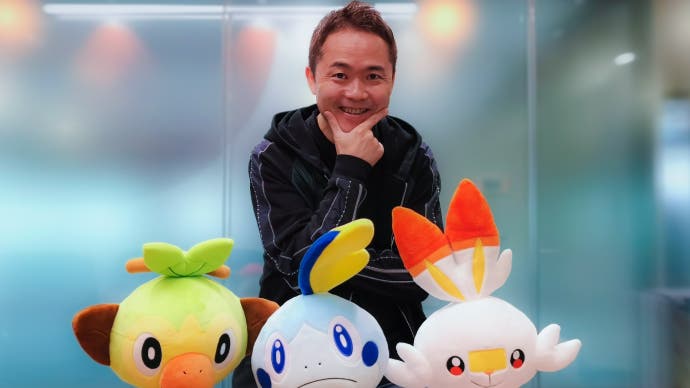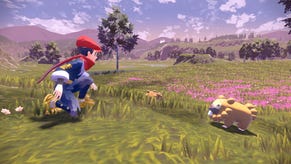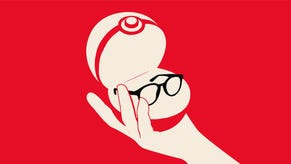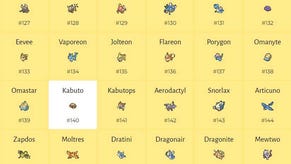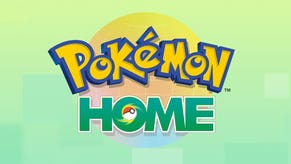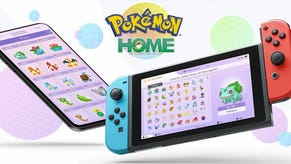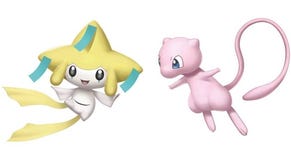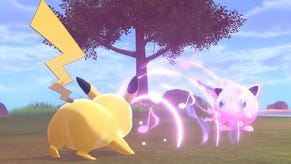Game Freak's Junichi Masuda and Shigeru Ohmori talk inspiration, Sirfetch'd, and pressure from Pokémon fans
"When you look at leeks in the UK, they're pretty big vegetables."
There have been a few ups and downs for Game Freak, in the build up to Pokémon Sword and Shield's launch. The initial reveal of Galar, the game's UK-inspired setting, was perhaps a tad lukewarm, and the decision to move away from a full, eight or nine hundred-strong Pokédex brought outcry from the predictably noisy sections of Pokémon fans.
But then, new Pokémon like Wooloo have charmed, and twists on old favourites, like the brilliant Sirfetch'd and Galarian my-little-Ponyta, have gone down a storm.
Having now played the enchanting first hours of Sword and Shield, too, the game's typical charm has once again started to shine through.
For Game Freak it must have been quite the ride. I spoke to veteran lead producer Junichi Masuda and a particularly jovial Shigeru Ohmori, the series' game director, about the surprising inspirations for those new Pokémon, how they went about researching the UK, and what dealing with those moments of backlash has been like.
Do note, though, that our conversation took place a few weeks ago now (shortly before the announcement of Galarian Ponyta), so the odd answers might feel slightly less coy than they were at the time. The following transcript has also been lightly edited, as you can read the rest of our conversation, about that weird camping minigame and what goes into Pokémon sausages, elsewhere on the site.

The first thing I wanted to ask about is the new Pokémon you've already announced. The likes of Sirfetch'd and Wooloo, and Galarian Weezing, seem to have gone down especially well this time, why do you think that is?
Shigeru Ohmori: The first thing to say is that we're really happy that fans have taken to these new Pokémon so quickly. It's hard to say exactly why fans have taken to them so well, but with Sirfetch'd for example, it might be the kind of unexpected nature of it, you know it's like "Oh, we never thought we'd see Farfetch'd change into something like this!" So you know fans are really enjoying that.
In other ways, so you mentioned Weezing for example, it might be the way they feel it matches with the feel of this kind of UK-based environment, so the new image of this Pokémon really matches with that and it kind of brings the game to life. So, there's different reasons why fans might have really taken to them, and we're happy that that's the case and that all the different kind of efforts that the designers have put in to creating them have born fruit.
On Sirfetch'd in particular, it seems like it's based on an old evolution for Farfetch'd that was in the Gold and Silver demo that was uncovered - is it based on a cancelled design that never made it into a final game?
SO: [Laughs] It's a completely new design. Really when we're looking at the UK as a region, we thought this kind of evolution, with it holding its leek like a sword and having a kind of shield design, really fit with this new region we were designing. So yeah, it's a new design.
Can you talk about when that design came about? Was it one of the first things you wanted to do, to have a Pokémon with a sword and a shield straight away?
SO: [Laughs] So when we're making these regional forms there are different thought processes that go into it, but one is definitely that we've got an existing Pokémon that we'd like to make evolve - so you've got other examples like Obstagoon, this time around as well, evolving from Linoone - and the designers really look at them and think "is there a way we can change this Pokémon and make it evolve into something else?"
Another consideration for Sirfetch'd in particular is that, when you look at leeks in the UK, they're pretty big vegetables, they're kind of chunky, big old things, whereas in Japan when you associate the word for "leek", it kind of crosses over with "spring onion" a bit, but you think of the small, thin ones. So the difference in what one looks like in Japan and what one looks like here is the kind of inspiration for why the leek that's held by Sirfetch'd is so much bigger than that that's held by a normal Farfetch'd.
Okay last question about Sirfetch'd, I promise: are you going to have an equivalent that's exclusive to Pokémon Shield like Sirfetch'd is for Sword?
[Both laugh] SO: So there's things we haven't announced yet so that's as far as we can go, but there are of course regional differences and certain ones are awaiting you to discover in Pokémon Shield so hopefully you'll look forward to that. [Note that this is mostly likely Galarian Ponyta, revealed as Shield-exclusive after this interview.]
Junichi Masuda: Please enjoy catching lots of Sirfetch'd and trading them with players from Pokémon Shield.
How do you go about researching a region like the UK for games like Sword and Shield? Do you base it on your idea of what a place is like, or do you research it in-depth?
SO: When we're designing a region the first thing we have is actually a kind of theme, in the game - so this time around it was "strength" and making the "strongest" Pokémon game, and when I was thinking about this, when I associated the word "strength", the UK came to mind, so that's where we decided to take that direction. But of course when you're making a region based off somewhere, once you've made that decision you then have to actually understand what that place is like, so we did actually come over here, investigate lots of different places, visit the actual locations that we wanted to kind of implement, and looked at different places and decided: well, this place would be something we wanted to design an area based on, and use that. So yeah, a lot of actual research goes into it rather than just loosely thinking of an area.
There are some features in Sword and Shield that seem to be inspired by Pokémon Go - the raids, the co-op element, carrying a smartphone with you - will there be any Pokémon Go integration like there was with Let's Go?
SO: In Pokémon Sword and Shield there's no direct communication with Pokémon Go, but you'll have seen the announcement for Pokémon Home, where there are plans to be able to send Pokémon from Pokémon Go, and take them around with you, so that's something we do have.
Along those lines, how do you manage the balancing of all the different fanbases of Pokémon? There are people who watch the anime, who got into Pokémon via Pokémon Go or mobile games like Masters, who first started years ago with Red and Blue, or who just started playing - are you still trying to cater to all of them in the main, handheld games Pokémon Sword and Shield, or are you now trying to separate them out?
SO: So to really make the new games something that each fan, regardless of where the entered the series can access easily, we do make sure that we explain what Pokémon is, the world of Pokémon, right from the start each time. You get an explanation of what the Pokémon world is all about, you get an explanation each time of how you throw a ball, how you catch a Pokémon. So, we make sure that regardless of how many fans we have, in each type of game, each new entry is something that any fan - or someone completely new to the series even - can jump into and enjoy right from the start.
JM: What we really want to do - whether it's someone that's played Pokémon Go or Pokémon Masters and has now been interested in playing Pokémon Sword and Pokémon Shield, or perhaps the other way around, where they start playing Pokémon Sword and Shield on their Switch and from that look into playing Pokémon Masters or Pokémon Go - is to encourage people to discover Pokémon as a whole, and enjoy all the different aspects of that.
Do you feel like it's quite difficult to please everyone? With things like the Pokédex issue recently, or some people wanting either a more difficult or more welcoming experience, is there a difficulty or a pressure there?
SO: Yeah there is definitely a level of pressure when you're making the game, but it doesn't make developing a game feel stressful or anything like that. At the end of the day it's something that we love doing, and is really fun to do. But we definitely really want to answer all the wishes of our fans and live up to their expectations, which is something that's quite challenging, so, in that sense yeah there's definitely a pressure. But we also, within ourselves, always strive to make the best game, and really deliver something that we're proud of and that we feel fans are going to enjoy. So yeah there's a fun and a pressure in there.
Has some of that negative feedback on the Pokédex - which I'm sorry to dwell on - had much of an impact on morale at Game Freak? I know you've mentioned that you're personally disappointed to not be able to include all of the Pokémon. Did the team feel saddened by the reaction at all?
JM: Of course, you know, you see these sort of negative comments and it does, as a developer, make you feel a bit down about certain things. But at the same time, you have to take criticism. For example with Pokémon Let's Go, early on there were a lot of comments that it was too easy, or it was kind of a bit too "kid-focused" and that sort of thing. That sort of comment is something you see, and you take on board, and really try and base improvements in the next game on the feedback you received from the last one.
So, with regards to the Pokédex issue in particular that you've mentioned, that was something that was a really hard decision internally, there were a lot of discussions about which direction we should take that in, and ultimately we felt that, for the overall game, focusing on creating the richest experience we could within that game, leaving the Pokédex as we did was the best solution overall.
It seems like Team Yell is maybe based a little on certain "rowdy" fans that we can have in video games - are they a reference to some of the louder parts of community, or is it just based on something like football hooligans here in the UK?
SO: So, this time around in Pokémon Sword and Shield there is this kind of sports atmosphere that takes a really large role, and within sports, all sports have fans and some of those fans go overboard - that's something we considered when designing them.
We also have this character called Marnie - and this is perhaps something a bit more Japan-specific - but you often have idols who have their really hardcore fans who kind of follow them everywhere, and that sort of overzealous fan is also something that this Team Yell has been based on, so that's really where we took inspiration for them from.
You mentioned Let's Go and a few comments about difficulty, but you also mentioned a while back that if it was really popular, you'd consider doing other Let's Go-style games based on others in the series. It seemed like it went down pretty well to me, in the end, so are you planning on doing more like that, carrying on a Let's Go series alongside a main one?
JM: So, at the moment there's no particular plans, but if the fans really like it then definitely keep those voices coming out to the Pokémon Company and Nintendo, and make sure we hear them! [Laughs] We wanna hear those comments!
Lastly, you've got some new features that are firsts for the series, things like autosave, open world elements, and a co-op PvE element - do you expact that trend, towards these kinds of quite modern design elements, to continue?
SO: Really what we want to do with that kind of thing is first look at how Pokémon Sword and Shield are received, see what features people enjoy and are well-praised, and then as we go forward in the future. There are obviously other games doing different things like that; we basically just want to look at what does well and what we can improve, based on the kind of feedback we receive for Sword and Shield, and think about what we want to put into future games.
Can you highlight any particular games that were inspirations for Sword and Shield - were there any outside of Sword and Shield that inspired certain decisions in particular?
SO: [Laughs] So, myself I'm a big fan and play a lot of games both Nintendo games and also games on other platforms, so you know it's very possible that whilst playing all these other games something has kind of inspired me indirectly to add into the Pokémon world. But really when designing new features on a professional level, it really is kind of looking at what sort of aspects in games are popular, and what works well in the current world - because it changes over time obviously - really looking at that and seeing what fits with our general design ideas, and seeing what we can add in to improve our games as we go.
